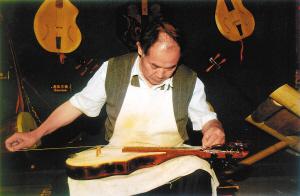The production method of Yunnan Lisu musical instrument "Qiben" on the verge of being lost
Qiben (Lisu language) is a traditional plucked musical instrument of the Lisu people, also known as "Qibuer" and "Qibo". It is popular in Fugong, Lanping, Lushui, Yongping, Weixi, Tengchong and other counties in Nujiang, Diqing, Dali, Baoshan and other cities in Yunnan Province. Its rush volume is thick and open, and its volume and color are stretched and powerful. Most of its performances appear as chords, and sometimes they are also used for single narration.
When the Lisu people are celebrating New Years and festivals, weddings, new houses are completed, and harvests are harvested, they all use their rushes to convey their feelings and express their joys, anger, and sorrow. Its appearance has triangular, pear-shaped, corbel-shaped and other shapes. Its piano box, piano rod and headstock materials are commonly used hard wood such as safflower cherry wood, azalea, nanmu, mulberry, red stick wood, catalpa, etc. The speaker panel is also made of tungsten, spruce, cedar, red pine and other textures. Softer thin wood. The strings are made of brown silk, horsetail or gut strings, and now mostly steel strings or nylon strings are used. Its production process includes material selection, production of various components (gut box, headstock, piano rod, peg, piano code and strings, etc.), component splicing, and winding and tuning.

With the infiltration of foreign culture, the life style and aesthetic taste of the Lisu people in various places have changed a lot.
Yunnan Minority Village Ethnic Musical Instrument Workshop was established in 2006. It hired Xue Wen'an, an expert in the protection, research and production improvement of ethnic musical instruments, to systematically collect, organize, inherit and develop ethnic musical instruments and musical scores. On the basis of inheriting the traditional craftsmanship of Qiben production of Lisu nationality in Yongping County, a series of Qibens in high, middle and low range are produced, which not only retains the traditional national style (appearance, timbre) and playing method of Qiben, but also The selection and production of materials have been improved to enhance the expressiveness of the instrument, the sound volume is more uniform and balanced, and the scope of application has been expanded. The batch of Qiben series musical instruments were taught and played in Mabanhe Village of Yongping County, Lisu Village in Guyong County of Tengchong County, Lisu Village of Yunnan Minority Village, Folk Orchestra of Yunnan Song and Dance Theater, and Art Troupe of Yunnan Frontier Guard Corps. effect and evaluation.
In 2009, with the approval of the Kunming Municipal People's Government, the production skills of the Lisu people in Yunnan Minzu Village were listed as the second batch of intangible cultural heritage protection lists in Kunming.
 渝公网安备 50010702504639号
渝公网安备 50010702504639号